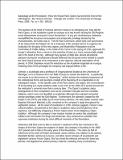Review of Backstage at the Revolution: How the Royal Paris Opera Survived the End of the Old Regime
Author(s)
Ravel, Jeffrey S.
Downloadjmh.pdf (17.33Kb)
OPEN_ACCESS_POLICY
Open Access Policy
Creative Commons Attribution-Noncommercial-Share Alike
Terms of use
Metadata
Show full item recordAbstract
The question at the heart of Victoria Johnson’s book is an intriguing one: how did the
Paris Opera, or the Academie royale de musique as it was known during the Old
Regime, avoid disbandment during the French Revolution? If any prerevolutionary
institution exemplified the luxurious consumption and aristocratic privilege decried by
the revolutionaries, the Opera was it. Yet the Paris Commune, which took over
governance of the Opera from the Maison du roi in February 1790, worked hard to
reorganize the institution for the glory of the new regime, and Maximilien Robespierre
and the Committee of Public Safety, in the midst of the Terror in the spring of 1794, approved the troupe’s relocation from a venue on the outskirts of town to a more
commercially viable site in the heart of the city. Although they agreed on little else,
almost all political partisans during the revolutionary decade believed that the government
needed to sustain the Paris Opera because of its importance to the vigorous
cultural nationalism of the period; in 1804, Napoleon recast the institution as the
Academie imperiale de musique, restoring most of the privileges the company had
enjoyed before 1789.
Date issued
2010-12Department
Massachusetts Institute of Technology. Department of Humanities. History SectionJournal
Journal of Modern History
Publisher
University of Chicago Press
Citation
Johnson, Victoria. "Backstage at the Revolution: How the Royal Paris Opera Survived the End of the Old Regime." Review by: By Jeffrey S. Ravel, The Journal of Modern History, Vol. 82, No. 4, Science and the Making of Modern Culture (December 2010), pp. 950-952.
Version: Author's final manuscript
ISSN
0022-2801